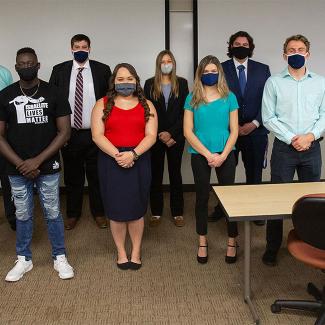What you'll learn studying Pre-Law at UW-Platteville
The University of Wisconsin-Platteville Pre-Law program is designed to help you make sound decisions and achieve success with a career in law. In your pre-law classes, you’ll explore topics such as political science, criminal justice, and business administration.
Pre-law majors compete in award-winning and nationally-recognized mock trials at invitational, regional, and national tournaments. By joining the Pre-Law Society on campus, you’ll be able to participate in sponsored events, tours of law schools, and lectures with visiting speakers. Your pre-law courses will also help prepare you for the Law School Admissions Test.
Careers in Law and Pre-law
Lawyers provide legal advice to clients and advocate for clients’ rights and interests. Some attorneys choose transactional work, such as handling real estate matters, establishing legal business entities, or drafting wills, trusts, and other estate planning documents. Other lawyers represent individuals, businesses, or government entities in civil or criminal legal matters. Legal professionals typically conduct research and rely on their analysis, communication, and organizational skills.
While you need to complete law school and meet state-specific requirements to work as an attorney, there are a variety of other potential career paths you might consider when you choose to pursue a pre-law degree as an undergraduate. Some potential roles include:
- Arbitrator
- Compliance officer
- Human resources manager
- Law enforcement officer
- Law librarian
- Lawyer
- Legal assistant
- Legal secretary
- Legislative assistant
- Mediator
- Paralegal
- Public affairs officer
- Victim advocate
When you choose a career in the legal field, you may work for a federal, state, or local government, or for a business or charitable organization. You could also choose to work for yourself, opening a law practice or working as an independent contractor.

Discover by doing
As a pre-law student at UW-Platteville, you will have numerous hands-on opportunities to supplement what you learn in the classroom. Conduct research, complete internships in the community, and attend university events designed to help prepare you for your future after graduation.


